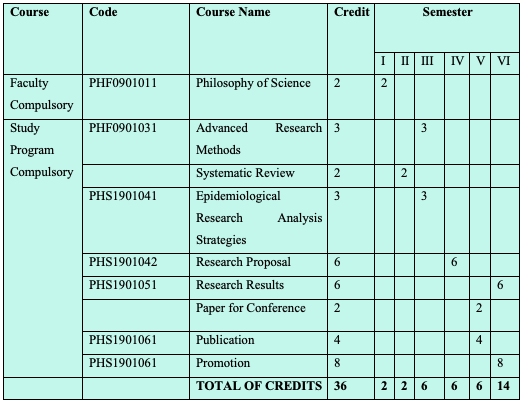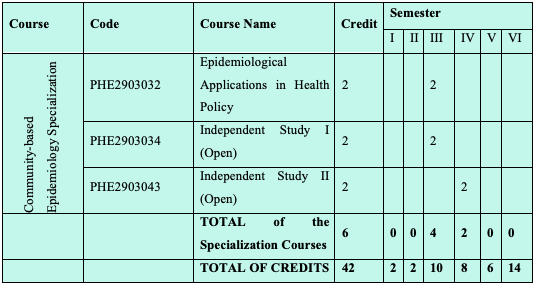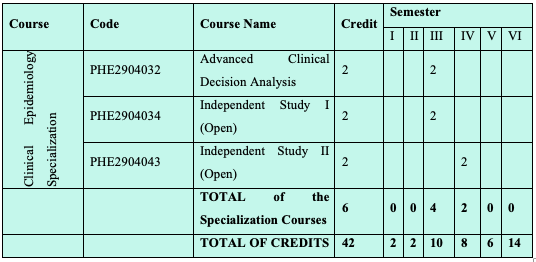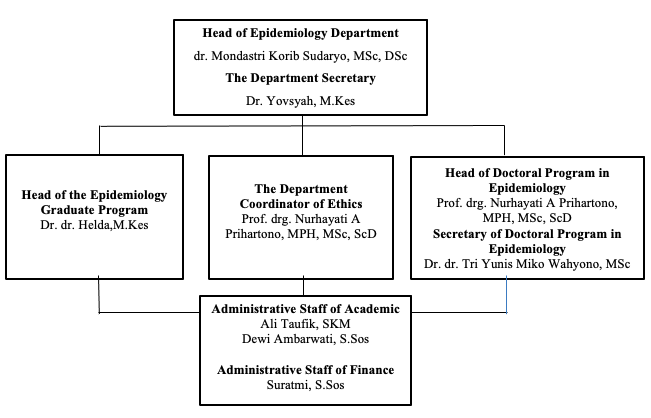Doctoral Program in Epidemiology
- Head : Prof. drg. Nurhayati A Prihartono, MPH, MSc, ScD
- Secretary : Dr. dr. Tri Yunis Miko, MSc
History
The Doctoral Program in Epidemiology is one of doctoral programs at the Faculty of Public Health Universitas Indonesia (FKMUI) that has an operational permit based on the Decree of the Director General of Higher Education Number 428/DIKTI/Kep/1998.
Vision, Mission, and Objectives of the Program
Vision of the Program
To be a center of science, technology and culture that is excellent and competitive through efforts to educate the nation’s life to elevate public welfare, so that it contributes to the Indonesian and world community development.
Mission of the Program
- Providing broad and fair access, as well as quality education and teaching.
- Organizing quality Tridharma (Three Pillars of Higher Education comprising Education, Research and Community Service) activities that are relevant to national and global challenges.
- Creating graduates who are high intellectual, virtuous and globally competitive.
- Creating an academic climate that supports realizing UI’s vision.
Objectives of the Program
To support the achievement of the FKMUI’s goals, the Doctoral Program in Epidemiology sets the Program objectives as follows:
- Creating an inclusive educational community, based on manners, trust, integrity, mutual respect and diversity in a safe and friendly environment.
- Preparing students to be graduates who are intelligent and have a conscience through the provision of clear and focused educational programs so as to implement, develop, enrich and advance science, technology and culture.
- Developing and disseminating science, technology and culture and striving for their application to enhance the dignity and life of the community, and enrich the national culture.
- Encouraging and strengthening the development of existing sciences, as well as new sciences and studies in the monodisciplinary, multidisciplinary, interdisciplinary and transdisciplinary fields to respond to the challenges of the increasingly complex life problems.
- Encouraging and supporting the active participation of the academic community in development and service to a democratic, prosperous and civilized society as an independent moral force.
- Increasing the quantity and quality of services to the nation, country and the world through collaborations, partnerships, and opportunities for cultural enrichment and sustainable education.
- Investing in professional development for all the UI academics, also in useful technology to gain competitive advantages through teaching, research and community engagement.
Profile of Graduates
Doctors of Epidemiology who are able to develop the science and methods of epidemiology to resolve health issues related to epidemiology disciplines through appropriate evidence/fact-based models with interdisciplinary and transdisciplinary approaches for research and community engagement development and the development of recommendations by doing advocacy to the policy makers and/or decision makers that apply nationally and internationally.
Learning Outcomes
Based on the analysis of needs, policies, benchmarks and professional organizations, as well as organization of Higher Education Institutions for Public Health, the formulation of the Doctoral Program in Epidemiology learning outcomes is as follows:
- Able to develop recommendations and do advocacy to policy makers and/or decision makers based on results of in-depth studies of epidemiological evidence and regulations/provisions that apply nationally and internationally.
- Able to contribute to the development of both clinical and community health sciences through national and international epidemiological approaches.
- Able to contribute to the development of epidemiology in an effort to elevate the public health status.
- Able to produce, present and publish scientific papers on epidemiological research in national and international forums.
- Able to manage, lead and develop teaching, research, and community engagement in the field of epidemiology that is beneficial for the benefit of mankind and the development of science which results in national and international recognitions.
- Able to develop ways of solving public health problems, especially those related to epidemiology disciplines through concepts, theories, methods or appropriate international evidence/fact-based models with interdisciplinary, multidisciplinary and transdisciplinary approaches.
- Able to develop and implement descriptive and analytical science and methods of epidemiology, so that creative, original and tested works are produced to improve the quality of health services that are efficient and effective and in accordance with the needs and standards demanded by internal, external stakeholders, including the labor market demands at the national and international levels.
Curriculum
The FKMUI Doctoral Program in Epidemiology Curriculum Structure can be seen as follows:
The Curriculum Structure is divided into groups of courses as follows:
| Structured Course | : | 16 credits |
| Research Proposal Exam (plus qualitative) | : | 6 credits |
| Research Results Exam Course | : | 6 credits |
| Scientific Papers for Conference | : | 2 credits |
| International Publication | : | 4 credits |
| Promotion Defense (plus pre promotion) | : | 8 credits |
| Total | : | 42 credits |
Distribution of Courses Each Semester
THE DOCTORAL PROGRAM IN EPIDEMIOLOGY COURSE STRUCTURE
Academic Year of 2020/2021



ORGANIZATIONAL STRUCTURE OF THE DOCTORAL PROGRAM IN EPIDEMIOLOGY 2020 – 2025




